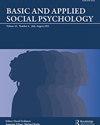Remembering that “Everybody Hurts”: The Role of Self-Compassion in Responses to Rejection
IF 1.8
3区 心理学
Q2 PSYCHOLOGY, SOCIAL
引用次数: 9
Abstract
Abstract Self-compassion involves treating oneself kindly, acknowledging that all humans experience suffering, and maintaining a balanced awareness of negative thoughts and feelings. Three studies (N = 614) examined the potential role of self-compassion in response to interpersonal rejection. Study 1 recruited a large, diverse internet sample and explored relationships between general perceived acceptance and several outcome variables (affect, depression, self-esteem), testing whether self-compassion moderates these relationships. Similarly, Study 2 tested whether self-compassion moderates the relationships between daily acceptance/rejection and outcome variables. Finally, Study 3 tested whether a self-compassion manipulation effectively promotes coping with rejection. Taken together, results reveal that self-compassion both predicts (Studies 1 and 2) and promotes (Study 3) relatively adaptive responses to rejection. These results suggest that a self-compassionate mindset may lessen the sting of rejection.记住“每个人都会受伤”:自我同情在拒绝反应中的作用
摘要自我同情包括善待自己,承认所有人都经历过痛苦,并保持对负面想法和感受的平衡意识。三项研究(N = 614)研究了自我同情在应对人际排斥中的潜在作用。研究1招募了一个庞大的、多样化的互联网样本,探讨了一般感知接受度与几个结果变量(情感、抑郁、自尊)之间的关系,测试了自我同情是否会调节这些关系。同样,研究2测试了自我同情是否会调节日常接受/拒绝与结果变量之间的关系。最后,研究3测试了自我同情操作是否能有效地促进应对拒绝。总之,研究结果表明,自我同情既预测(研究1和2)又促进(研究3)对排斥反应的相对适应性。这些结果表明,自我同情的心态可以减轻被拒绝的痛苦。
本文章由计算机程序翻译,如有差异,请以英文原文为准。
求助全文
约1分钟内获得全文
求助全文
来源期刊

Basic and Applied Social Psychology
PSYCHOLOGY, SOCIAL-
CiteScore
4.50
自引率
12.50%
发文量
7
期刊介绍:
Basic and Applied Social Psychology (BASP) emphasizes the publication of outstanding research articles, but also considers literature reviews, criticism, and methodological or theoretical statements spanning the entire range of social psychological issues. The journal will publish basic work in areas of social psychology that can be applied to societal problems, as well as direct application of social psychology to such problems. The journal provides a venue for a broad range of specialty areas, including research on legal and political issues, environmental influences on behavior, organizations, aging, medical and health-related outcomes, sexuality, education and learning, the effects of mass media, gender issues, and population problems.
 求助内容:
求助内容: 应助结果提醒方式:
应助结果提醒方式:


